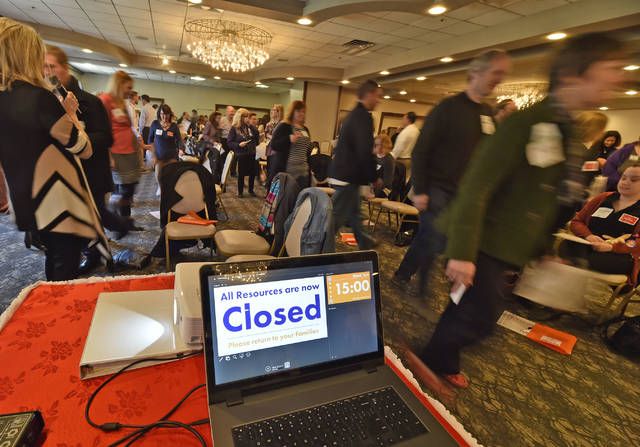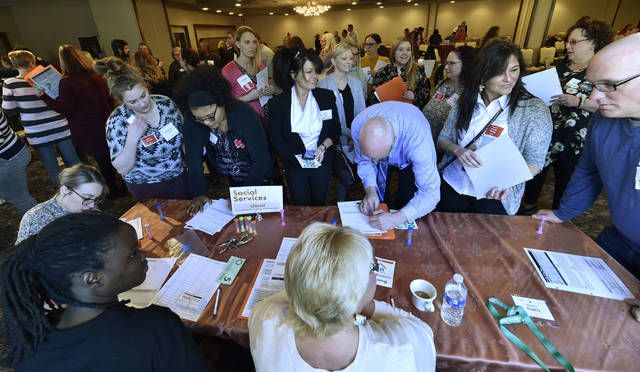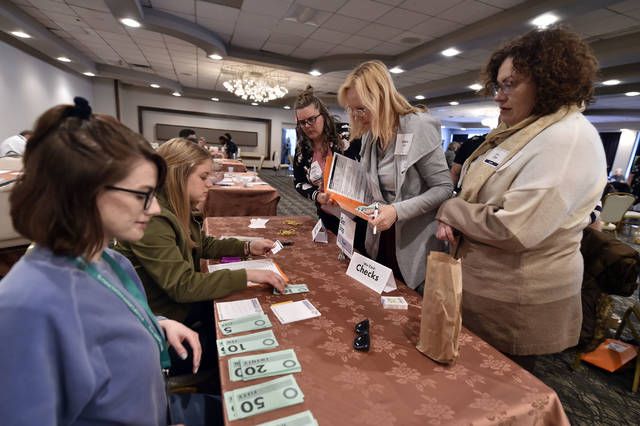Click here to subscribe today or Login.
PLAINS TWP. — In real life, the Rev. Marty Garms is the pastor of East End Primitive Methodist Church in Wilkes-Barre.
On Tuesday, Garms was a participant in “COPE in Community” — a daylong program designed to better prepare workers who deal with people in poverty.
Garms assumed the role of an 8-year-old girl in a family of four with an abusive father. Garms’ group was one of several simulated families who were given scenarios that typify the plight of individuals and families in poverty.
The professionals who work with people who struggle with poverty got the opportunity to feel the stress of what those individuals and families deal with on a daily basis.
More than 100 people who work for various agencies that serve those in need gathered at The Woodlands Inn for the compelling workshop.
Joseph Kloss, project director at Luzerne-Wyoming Counties System of Care, offered two statistics:
• Luzerne County’s total population poverty rate is at 16 percent, compared to the state’s 12.5 percent.
• Luzerne County’s childhood poverty rate is 47 percent, the state rate is 18.5 percent.
“This training can help them get a better understanding of what those in poverty deal with, enabling them to better serve them,” said Mandy Chapman of Care Portal, who coordinated the presentation with the agencies and the Luzerne County Human Services Division. “With this simulation, you get to feel the stress of what the families are going through.”
Garms said his simulated family had lost everything and were struggling to make ends meet.
All the scenarios were based on actual case issues.
“We learned you do whatever you can to protect yourself and your family,” Garms said. “We had an abusive father who abused me, my brother and our mother. We learned what it’s like to live in fear — fear of him coming back and fear if he would get in the house.”
As difficult as it was, Garms said he and all participants came away with a better understanding of what goes on with families in poverty.
“It allowed us to build a greater sense of compassion for people in this situation and a greater desire to come up with ways to help them,” the pastor said. “And it motivates us to seek out other people to get involved, as well as to try to meet the needs of others.”
Tara Vallet, administrator at Mental Health and Developmental Service for the Luzerne County Office of Human Services, said the simulation provided a clearer understanding of issues from the clients’ perspective.
“Working in the system, we understand the system and just assume everyone else in the community understands it as well,” Vallet said. “But until you actually need services, you don’t know how to access them.”
Following the simulation ceremony in the morning, there were several break-out sessions for the professionals to attend:
• Young Adult Panel — A walk-through of the lives of young adults living in poverty, how poverty impacts their decision-making, and how supports are hard to come by.
• Poverty’s Impact on Mental Health — Focus on how poverty affects the mental health of individuals across the lifespan. Experiencing poverty during childhood is linked to lower academic achievement, truancy, co-morbidity with other psychological disorders, and problems with attention and focus. Experiencing poverty during adulthood is linked to anxiety disorders, depressive disorders, and suicide.
• In the Gap — Offers a greater understanding of the real-life struggles, realities of vulnerability and needs of those living in the gap, particularly single moms. Demonstration of the financial scenarios that perpetuate the challenges, and the importance of advocates and community leaders to have a sense of urgency to help solve the poverty epidemic.
• Poverty & Addiction — Discussion on the impact poverty has on substance use disorders, including the steps taken and services implemented to assist individuals with these disorders.







